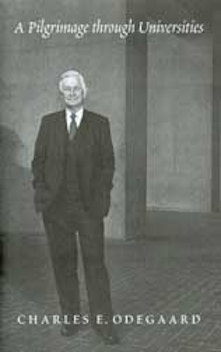President of the University of Washington from 1958 to 1973, a time of tremendous change, Charles Odegaard has written an absorbing memoir of his personal and institutional background and his development as a scholar and university administrator. President Richard L. McCormick and Professor of Biomedical Ethics Keith R. Benson further discuss Odegaard’s lasting contributions to the University of Washington.
Beginning with his own undergraduate experience, Odegaard came to recognize the importance of the humanities as the vital center of the university tradition. Throughout his career he emphasized that education concerned with the quality of life should be foremost in the minds of university administrators and faculty. After retirement he continued this mission in his book Dear Doctor: A Personal Letter to a Physician, focusing on the need to train physicians in the humanities in order to strengthen the doctor-patient relationship.
Growing up in Chicago, Odegaard attended Dartmouth College and then Harvard University, where he studied medieval history and received his doctorate in 1937. He then joined the history department faculty at the University of Illinois. A four-year tour of duty as an officer in the U.S. Navy during World War II deeply influenced his comprehension of how people are motivated to work toward a common goal under difficult conditions. In 1948 he was persuaded to move to Washington, D.C., to head the American Council of Learned Societies. In 1952 he accepted the position of Dean of Arts and Sciences at the University of Michigan, and he moved to the presidency of the University of Washington in the fall of 1958.
Under Odegaard’s strong leadership the University of Washington grew into a major institution of higher learning and research. Among his primary concerns were finding superior academic administrators, accommodating rapid growth in enrollment, encouraging interdisciplinary cooperation, fostering greater communication between students and faculty, working to establish a realistic system linking state universities and colleges, and dealing with student discontent during the Vietnam War years and the periods of minority student protests.
In A Pilgrimage through Universities, Charles Odegaard conveys his perspective on the role a major university should play in the modern world.

